UP IHR holds Consultation on UNCRC General Comment No. 27 on Children’s Rights to Access to Justice and Effective Remedies
On September 20, 2024, UP Law Center Institute of Human Rights (UP IHR), in partnership with Child Rights Coalition Asia, held a consultation on the United Nations Committee on the Rights of the Child (UNCRC) General Comment No. 27 (GC 27) on Children’s Rights to Access to Justice and Effective Remedies.
UP IHR Director Professor Elizabeth Aguiling-Pangalangan opened the program with a strong message of justice for children. Drawing from her years of service as an advocate for children’s rights and as a Family Law professor, Professor Aguiling-Pangalangan expounded on the current notions of access to justice for children, the restrictions on their capacity to act as minors, and emphasized the need to provide an accessible and effective pathway to justice for all children regardless of their circumstances. Professor Aguiling-Pangalangan reminded participants of the significant role that they play, as individuals and organizations, in the development of child-centered systems towards the protection of children’s rights and the eradication of existing practical, legal, social and cultural barriers.
Regional Executive Director of the Child Rights Coalition Asia, Ms. Amihan Abueva, provided an overview of the UNCRC General Comments and their role in ensuring the proper implementation of child’s rights across the globe; and an overview of the focus of the consultation, GC 27. Ms. Abueva emphasized that the goal of the Consultation is to provide guidance on ensuring the empowerment of all children as rights-holders.
The consultation was delivered through two (2) breakout groups. Breakout Groups I and II were facilitated by Professor Aguiling-Pangalangan and UP IHR University Researcher Atty. James Gregory Villasis, respectively, for the morning session that tackled the Legal and Policy Framework and Budgeting areas; and UP IHR Head Legal Officer Atty. Raymond Marvic Baguilat and UP IHR Senior Law Reform Specialist Atty. Daniel Lising, M.D., accordingly, for the afternoon session that tackled data and collection methods utilized and available programmes and services catered for children’s needs. Each breakout group tackled the same focus areas, based on the UNCRC Guidance Notes, and both groups convened after each session to share and discuss their findings.
Participants raised several issues and cited anecdotes from their individual and organization’s experiences as child’s rights advocates. Several issues, areas for exploration or further discussion, and recommendations were made with regard (1) children’s rights in the domestic Legal and Policy Framework, (2) the inclusion of children in the overall national investments in access to justice and rule of law, (3) the current data and collection methods of children’s access to justice and effective remedies, and (4) the availability of and access to services and programmes that provide legal, social, or paralegal support to children seeking a remedy.
Children’s rights in the domestic Legal and Policy Framework
The consultation surfaced that while several laws provide, in general, for the respect of children’s rights and participation, the same are reported as not being properly implemented. This includes the lack of a child-friendly legal system such that the rights of children to privacy and confidentiality are often violated and legal processes are often insensitive to the child victim’s needs. Notably, the lack of a genuinely child-friendly legal system. Thus, consideration must be had with regard to a child’s capacity to act and to access justice independently within the social, cultural, and legal domestic contexts; and their unique circumstances such as children in situations of abuse, children with disabilities, children in situations of armed conflict, and child victim-survivors. Several recommendations were made with regard to awareness campaigns and knowledge resource sharing including the integration of Human Rights Education, focused on the rights of the child, in the educational curriculum with distinct use design for children and various professionals. This is to ensure that children gain appreciation for their rights and become familiar with remedies available to them; and for professionals working with them to ensure that their rights and needs are protected in a child-friendly manner.
The inclusion of children in the overall national investments in access to justice and rule of law
Similarly, while there is a general fund with regard access to justice and rule of law, there is no specific allocation for children – as these allocations are found in disparate provisions of the national budget. Further, the allocations are insufficient. This lack of funding translates to a lack of child-friendly facilities, the underutilization of services for children, poor infrastructure to support services for children, and the lack of training and human resources required to deliver such services. The lack of financial aid or support for child victims or witnesses also surfaced such as the lack of support for transportation costs that become a critical barrier to access to justice. As local level funding remains a critical issue, it was suggested that the Mandanas Ruling be explored.
Current data and collection methods of children’s access to justice and effective remedies
Current data on children are disaggregated and incomplete and is collected and treated differently by different government agencies. This is attributed to the lack of clear guidelines in the collection of data of a child. Thus, a systemized method of collecting data at all levels is recommended alongside training on truthful and sensitive data collection methods and treatment of data.
Services and programmes that provide legal, social, or paralegal support to children seeking a remedy
Participants shared the wealth of available programs in their organizations that ranged from in-person and online assistance to children and their guardians or parents; from legal aid, financial aid, to psychosocial services, trauma-informed counseling, and care interventions; and capacity-building programs, trainings, and awareness programs designed for frontline workers, service providers, professionals, and children and their guardians.
It was recommended that these programs may be strengthened by the participation of relevant government agencies. More specific recommendations were made with regard the utilization of the MAhalin at KAlingain ang mga BATA (MAKABATA) Helpline in consideration of other helplines already available, providing support to the Child Protection Committees in schools that are mandated to raise human rights awareness, and the development and dissemination of Information, Education, and Communication (IEC) materials specially in schools. Ultimately, participants iterate the whole of government and whole of society approach in addressing the gaps and strengthening of existing programs for children’s rights to access to justice and effective remedies.
In closing the program, Ms. Abueva highlights the need for all sectors and groups to better coordinate and cooperate as children’s needs are distinct – and that it takes every sector to work together to address these distinct needs more efficiently.
The program was attended by Adhikain para sa Karapatang Pambata, the Alternative Law Groups, the Humanitarian Legal Assistance Foundation, Inc., Children’s Legal Rights and Development Center, Inc., the Department of Social Welfare and Development, Council for the Welfare of Children (CWC), various chapters of the Integrated Bar of the Philippines, the Juvenile Justice and Welfare Council the National Union of People’s Lawyer, the International Justice Mission, Tanggapang Panligal ng Katutubong Pilipino, the UP College of Law Gender Law and Policy Program, the Ateneo Human Rights Center, the Miriam College Child Rights Advocacy Center, the Free Legal Assistance Group, the Department of Justice, the Educational Research and Development ASsistance Foundation, Inc.,the American Bar Association Rule of Law Initiative, the Initiatives for Dialogue and Empowerment through Alternative Legal Services, Inc., the Commission on Human Rights, Association for the Rights of Children in Southeast Asia, Bahay Tulayan, ECPAT, and Plan International Philippines.
Findings of the program will form part of the submission to the UN CRC in its development of General Comment 27 on Children’s Rights to Access to Justice and Effective Remedies.

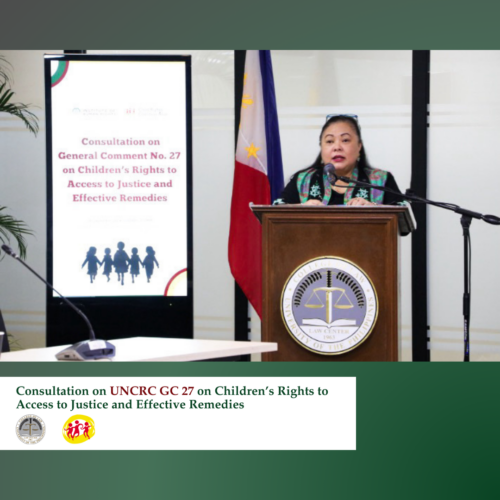
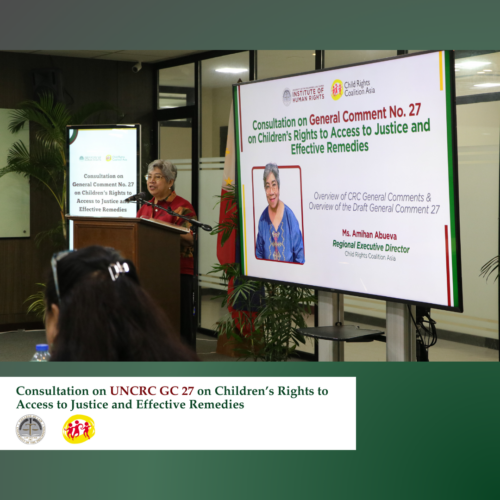
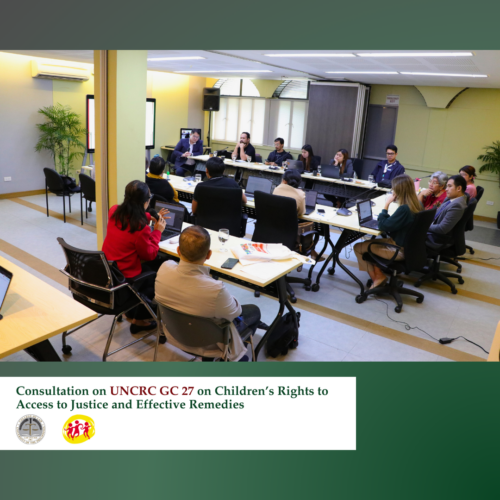
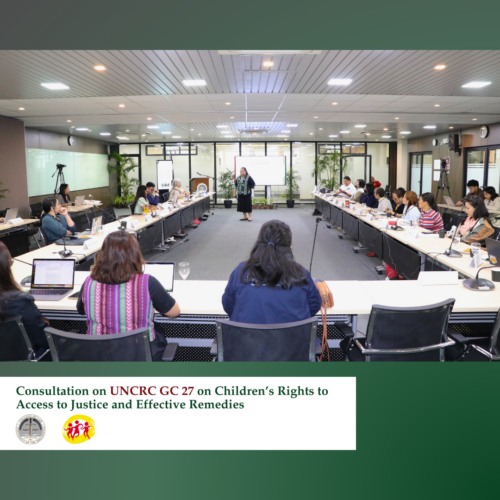
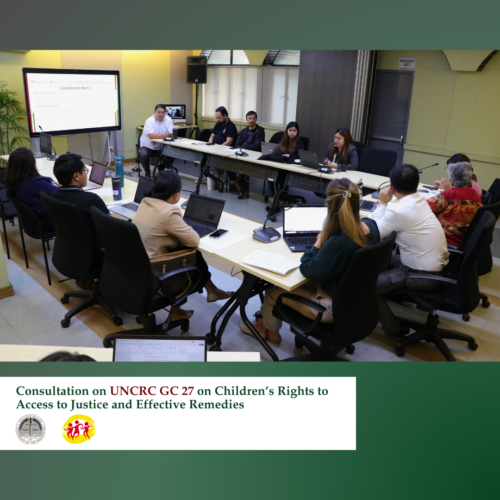
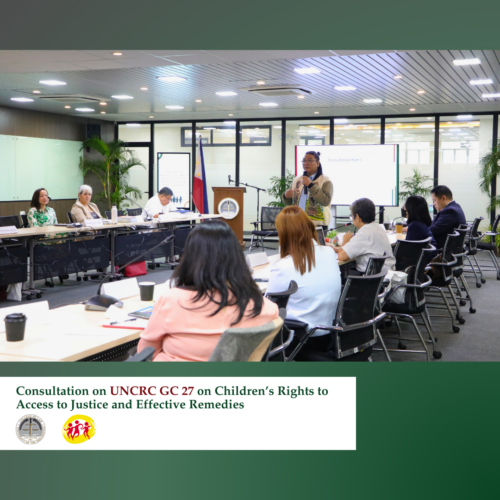
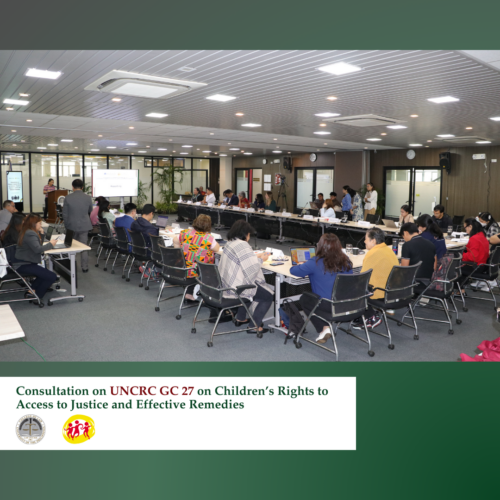
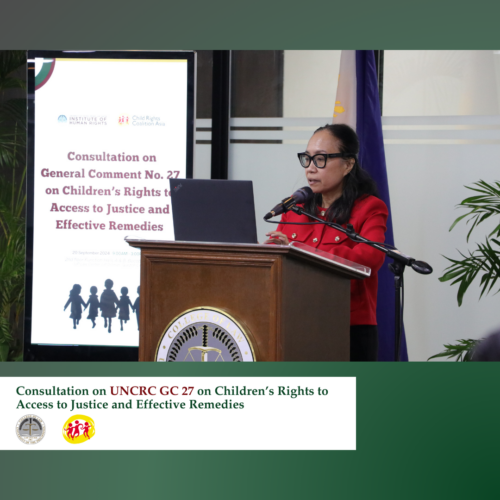
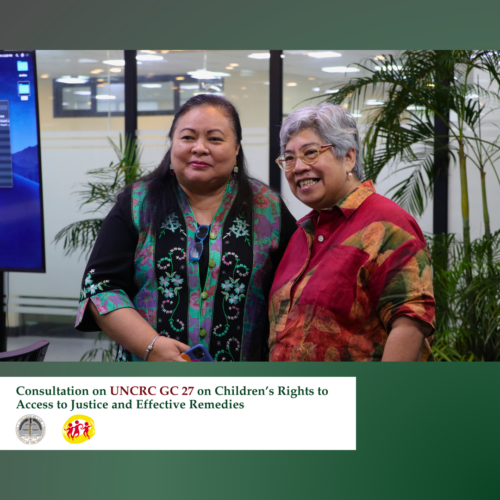
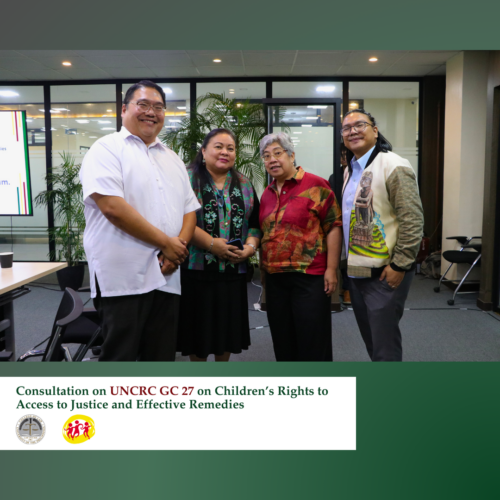






































































































 on the upper right corner to select a video.
on the upper right corner to select a video.